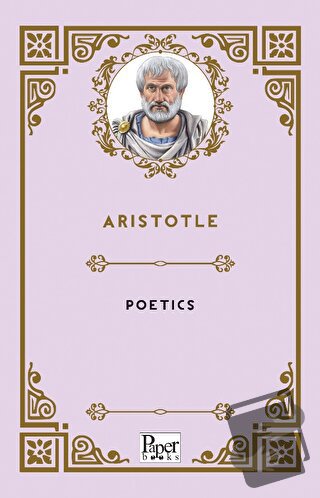
Aristotle’s Poetics is the earliest surviving work of Greek dramatic theory and first extant philosophical treatise to focus on literary theory. In this text Aristotle offers an account of ποιητική, which refers to poetry and more literally “the poetic art,” deriving from the term for “poet; author; maker,” ποιητής. Aristotle divides the art of poetry into verse drama (to include comedy, tragedy, and the satyr play), lyric poetry, and epic. The genres all share the function of mimesis, or imitation of life, but differ in three ways that Aristotle describes:
Differences in music rhythm, harmony, meter and melody.
Difference of goodness in the characters.
Difference in how the narrative is presented: telling a story or acting it out.
The surviving book of Poetics is primarily concerned with drama, and the analysis of tragedy constitutes the core of the discussion.
| Taksit Sayısı | Taksit tutarı | Genel Toplam |
|---|---|---|
| Tek Çekim | 48,00 | 48,00 |
| 3 | 17,48 | 52,45 |
| 6 | 9,23 | 55,39 |
| 9 | 6,48 | 58,32 |
| 12 | 5,10 | 61,25 |
| Taksit Sayısı | Taksit tutarı | Genel Toplam |
|---|---|---|
| Tek Çekim | 48,00 | 48,00 |
| 3 | 17,48 | 52,45 |
| 6 | 9,23 | 55,39 |
| 9 | 6,48 | 58,32 |
| 12 | 5,10 | 61,25 |
| Taksit Sayısı | Taksit tutarı | Genel Toplam |
|---|---|---|
| Tek Çekim | 48,00 | 48,00 |
| 3 | 17,48 | 52,45 |
| 6 | 9,23 | 55,39 |
| 9 | 6,48 | 58,32 |
| 12 | 5,10 | 61,25 |
| Taksit Sayısı | Taksit tutarı | Genel Toplam |
|---|---|---|
| Tek Çekim | 48,00 | 48,00 |
| 3 | 17,48 | 52,45 |
| 6 | 9,23 | 55,39 |
| 9 | 6,48 | 58,32 |
| 12 | 5,10 | 61,25 |
| Taksit Sayısı | Taksit tutarı | Genel Toplam |
|---|---|---|
| Tek Çekim | 48,00 | 48,00 |
| 3 | 17,48 | 52,45 |
| 6 | 9,23 | 55,39 |
| 9 | 6,48 | 58,32 |
| 12 | 5,10 | 61,25 |
| Taksit Sayısı | Taksit tutarı | Genel Toplam |
|---|---|---|
| Tek Çekim | 48,00 | 48,00 |
| 3 | 17,48 | 52,45 |
| 6 | 9,23 | 55,39 |
| 9 | 6,48 | 58,32 |
| 12 | 5,10 | 61,25 |
| Taksit Sayısı | Taksit tutarı | Genel Toplam |
|---|---|---|
| Tek Çekim | 48,00 | 48,00 |
| 3 | - | - |
| 6 | - | - |
| 9 | - | - |
| 12 | - | - |
Aristotle’s Poetics is the earliest surviving work of Greek dramatic theory and first extant philosophical treatise to focus on literary theory. In this text Aristotle offers an account of ποιητική, which refers to poetry and more literally “the poetic art,” deriving from the term for “poet; author; maker,” ποιητής. Aristotle divides the art of poetry into verse drama (to include comedy, tragedy, and the satyr play), lyric poetry, and epic. The genres all share the function of mimesis, or imitation of life, but differ in three ways that Aristotle describes:
Differences in music rhythm, harmony, meter and melody.
Difference of goodness in the characters.
Difference in how the narrative is presented: telling a story or acting it out.
The surviving book of Poetics is primarily concerned with drama, and the analysis of tragedy constitutes the core of the discussion.




















